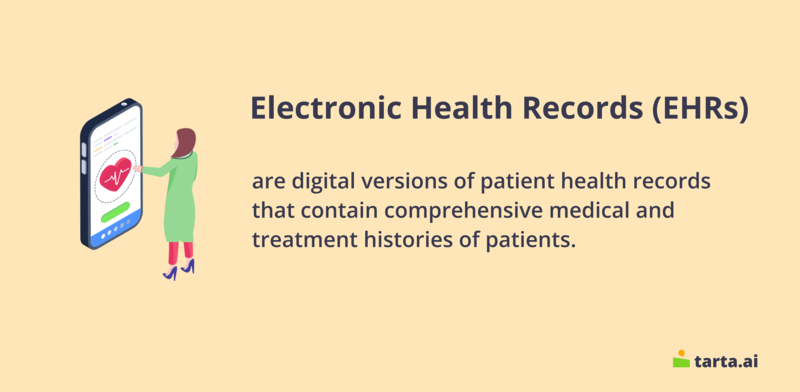The Benefits and Challenges of Electronic Health Records (EHRs) in Healthcare

The EHR system is designed to capture, store, and manage patient data that is recorded in digital format. The EHR system includes all medical and treatment history of a patient, including laboratory results, radiology images, medication lists, allergies, and other medical records.
EHRs are a significant innovation in healthcare that has revolutionized the way patient data is managed, stored, and accessed. Before EHRs, patient records were typically kept on paper and stored in filing cabinets. This process was time-consuming and often resulted in errors, misinterpretation of information, and difficulty in accessing records in a timely manner. With the implementation of EHRs, patient records can now be easily accessed, shared, and updated, making the healthcare system more efficient and effective.
The concept of electronic medical records (EMRs) emerged in the 1960s, which were essentially digital versions of paper records. However, the modern EHR, which includes features such as advanced clinical decision support, interoperability, and patient engagement tools, did not emerge until the 21st century.
Benefits of EHR
One of the primary benefits of EHRs is the improved quality of patient care. EHRs provide healthcare providers with instant access to a patient's medical history, allowing them to make more informed decisions about treatment plans. EHRs also reduce the risk of medical errors caused by illegible handwriting or incomplete records, ensuring that patients receive the right treatment at the right time.
Another benefit of EHRs is the ability to easily share patient records between healthcare providers. In the past, transferring records between hospitals or clinics was a cumbersome process, often involving the physical transfer of paper records. With EHRs, healthcare providers can quickly and easily share patient records with other providers, ensuring that patients receive consistent care, regardless of where they are treated.
EHRs also provide benefits for healthcare organizations. By digitizing patient records, healthcare organizations can reduce their administrative costs associated with managing paper records. EHRs also allow organizations to analyze patient data in real-time, providing valuable insights into patient populations and trends that can be used to improve patient care.
Challenges in Implementing EHR
Despite the many benefits of EHRs, there are also some challenges associated with their implementation. Some of the most common challenges include:
Cost: Implementing an EHR system can be a costly process for healthcare organizations. The cost can include software, hardware, training, and support, among other expenses. This can be especially challenging for smaller healthcare organizations that may not have the financial resources to invest in an EHR system.
User Resistance: Healthcare providers and staff may resist the implementation of an EHR system due to concerns about their ability to learn the new system, the potential for workflow disruptions, and changes to their roles and responsibilities. It is essential to provide sufficient training and support to help users adapt to the new system.
Technical Issues: Implementing an EHR system involves technical challenges such as data migration, integration with other systems, and customization to meet the specific needs of the organization. Technical issues can result in system downtime, which can disrupt patient care and lead to delays.
Data Quality: EHRs rely on accurate and complete data to be effective. Data quality issues such as missing or incorrect data can compromise the usefulness of the EHR system and lead to medical errors or misdiagnosis.
Security and Privacy: EHRs contain sensitive patient data, making security and privacy critical concerns. Healthcare organizations must implement appropriate security measures to protect patient data from unauthorized access or breaches.
Interoperability: EHRs must be able to exchange data with other healthcare systems, including those used by other healthcare providers and hospitals. Lack of interoperability can result in incomplete or inaccurate patient information, leading to errors in diagnosis and treatment.
Overcoming these challenges requires careful planning, stakeholder engagement, and effective project management. Healthcare organizations must develop strategies to mitigate risks and address the unique needs of their organization and users to ensure a successful EHR implementation.
In conclusion, Electronic Health Records (EHRs) have revolutionized the way patient data is managed, stored, and accessed in the healthcare industry. EHRs provide numerous benefits, including improved quality of patient care, easy sharing of patient records between healthcare providers, and reduced administrative costs for healthcare organizations. While there are challenges associated with their implementation, the benefits of EHRs are clear, and they are likely to continue to play an important role in healthcare for years to come.
- Electronic Health Records (EHRs) are digital versions of patient health records that contain comprehensive medical and treatment histories of patients.
- EHRs have revolutionized the way patient data is managed, stored, and accessed in the healthcare industry.
- EHRs provide numerous benefits, including improved quality of patient care, easy sharing of patient records between healthcare providers, and reduced administrative costs for healthcare organizations.
- The challenges associated with implementing EHRs include the cost of implementation and the learning curve associated with a new system.
FAQ
What information is stored in EHRs?
EHRs include all medical and treatment history of a patient, including laboratory results, radiology images, medication lists, allergies, and other medical records.
How are EHRs different from electronic medical records (EMRs)?
EHRs are designed to capture and manage patient data from multiple healthcare providers and settings, while EMRs are more limited in scope and are typically used within a single healthcare organization or practice.
Are EHRs secure?
Yes, EHRs are designed with security and privacy in mind. They typically have multiple layers of security and encryption to protect patient data from unauthorized access or disclosure.
What are EHRs?
EHRs are digital versions of patient health records that contain comprehensive medical and treatment histories of patients. The EHR system is designed to capture, store, and manage patient data that is recorded in digital format.